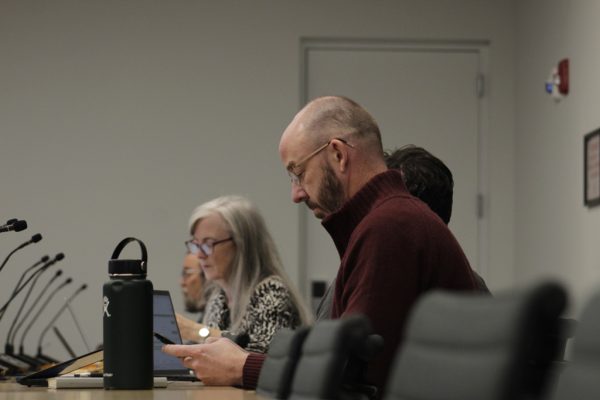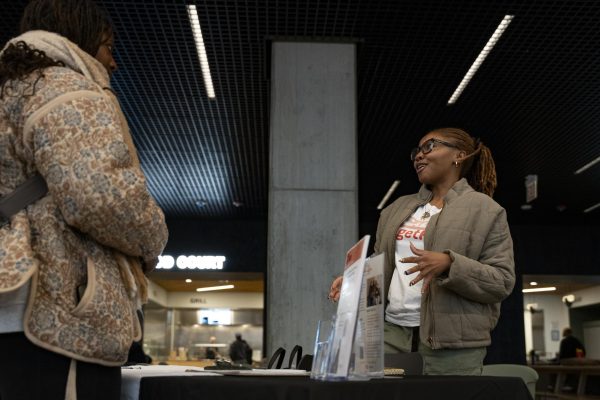Faculty Senate calls on President Carter to address concerns
May 7, 2012
In an letter from the Faculty Senate Executive Committee to the Columbia faculty sent on May 7, the Senate announced that it will hold a meeting with President Warrick L. Carter on May 16 to discuss several specific concerns with the leadership of the college, such as the “lack of transparency and trust,” according to the attached open letter to Carter. While details about the meeting are still to come, the Senate’s letter to Carter is as follows:
“The Faculty Senate recognizes that Columbia College is entering a transformative period in its history. The College faces the many challenges involved in the implementation phase of Blueprint | Prioritization as well as a shifting environment for higher education marked by serious concerns about value, affordability, loan debt, retention, and employability. Fortunately, thanks to the work of the Blueprint | Prioritization Teams, and especially the global recommendations made in the One Columbia document, we believe the College now has a vision of how to begin to address these issues.
The work before us will require collaboration across all of the college’s constituencies and engaged leadership rooted in transparency and trust. It is our collective concern regarding the current lack of such transparency and trust that prompts us to invite Dr. Carter to meet with the Faculty Senate in the hope that he can join with us in finding effective ways forward.
Our concerns are rooted in a lack of stability, and a resulting lack of confidence, in upper level administration at the college. Last summer the Columbia community was shocked by the sudden, unexplained dismissal of the Provost and the President’s two-month sabbatical that immediately followed. Concerns about the stability of leadership were further heightened by the appointment, again without explanation, of an interim CFO, and the subsequent difficulties the College had in hiring a permanent CFO. The fact that the College embarked on the Blueprint | Prioritization process while these key positions were interim deprived the College of crucial vision and leadership during that process and undermined the College community’s trust in Blueprint | Prioritization from the very beginning.
More recently we are left wondering about the causes and effect of the departure of the Vice President of Human Resources. We are also concerned about the low rankings of the offices of Institutional Advancement and Institutional Planning (which received among the lowest scores in the entire College, 14 out of 40 and 20 out of 40, respectively) in the Support and Operations report.
There has also been a failure to manage Columbia College’s public image. Across the College we have fielded hundreds of concerned inquiries since the Howard Reich article in the Chicago Tribune, March 4, and the circulation of the video of the President’s interactions with students, March 21. This situation has jeopardized the reputation of our College and most immediately, our abilities to recruit students at a period in higher education already marked by fierce competition. The lack of an effective response has failed to ameliorate public concerns or mitigate attendant consequences.
We are at a low point in institutional morale and in danger of losing our culture of openness and mutual respect at Columbia College Chicago. In one example, an email to faculty dated March 14, 2012, discouraged conversations with students about the Blueprint | Prioritization process. This was read by many as a lack of trust in faculty to teach their students about the issues facing their college, and a lack of trust in students to respond thoughtfully and productively. In the few occasions where the President has addressed faculty in person, his remarks have been received as blaming and finger-pointing. The President’s absence from the campus—both real and figurative—has contributed to a sense of disconnection and discouragement within our community.
In order to begin to address the above concerns, and to move forward and realize the potential of some of the global recommendations in the One Columbia document, the Faculty Senate recommends the following actions:
• The President should actively reach out in numerous ways to mend relationships and reestablish trust with faculty, staff, students, and external audiences.
• The President should immediately enact the recommendation made in One Columbia that he “restructure the President’s Cabinet. The Cabinet should consist of: Provost, CFO, VP Student Affairs, VP Campus Environment, and Deans, and must maintain a focus on student learning experiences” (One Columbia, Section 1.1). Regular meetings of this restructured cabinet are essential for successful Blueprint | Prioritization implementation processes.
• The implementation of Blueprint | Prioritization recommendations for specific programs must be rooted in substantial conversation among relevant constituents; research into the long-term implications, logistics, and costs; and planning for transitions and structures that are least disruptive to students, staff and faculty, most cost-effective and efficient, and most likely to create a stable future for the college. Conversations, research, and planning that involve faculty who are on nine-month contracts should not begin until the resumption of faculty contracts, August 15, 2012.
• The President’s Blueprint | Prioritization recommendations should include explanatory financial documentation for proposed decreases in resources or eliminated programs or positions.
• The Faculty Senate and the entire College community should be regularly apprised of the administration’s efforts to move forward with the initiatives outlined above.
We ask the President to take the actions above and lead in reaffirming the assets and strengths of our institution. We ask as a faculty who are committed to investing our energies and abilities to ensure the long-term health and prosperity of Columbia College Chicago.”






